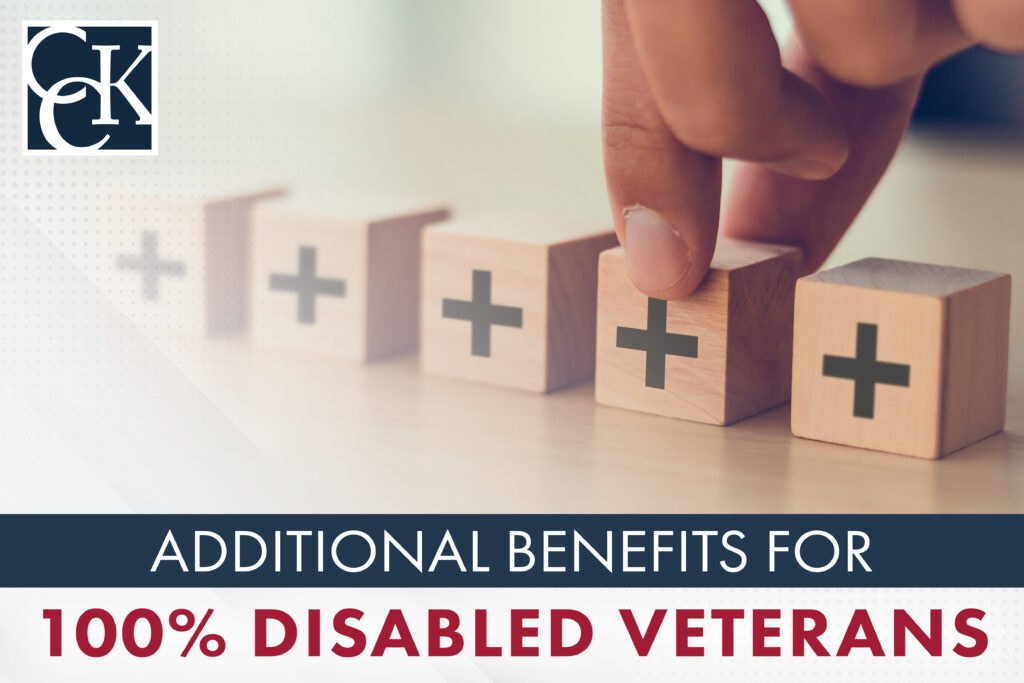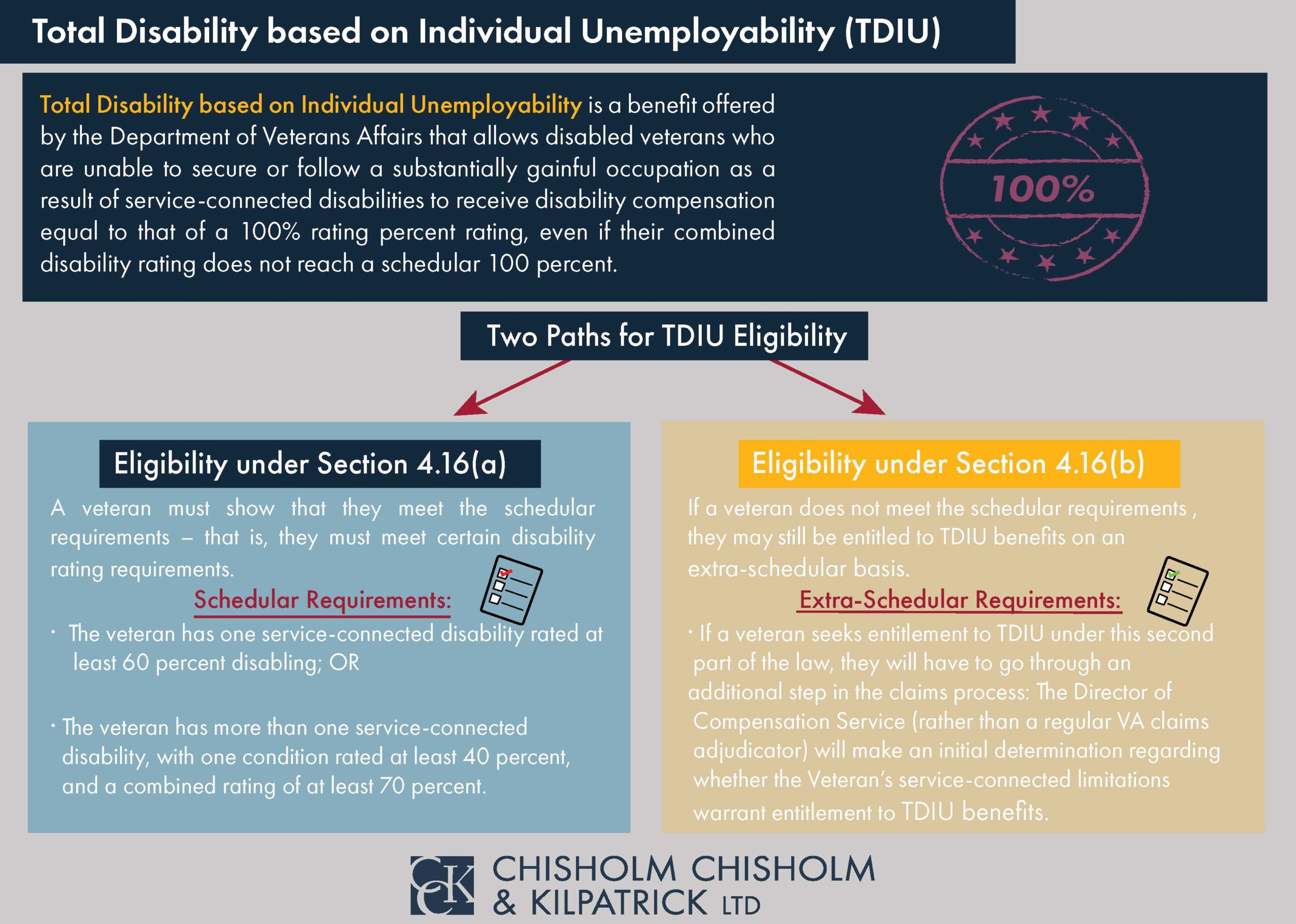Additional Benefits for 100% Disabled Veterans

CCK Law: Our Vital Role in Veterans Law
Monetary compensation is a key benefit for 100 percent disabled veterans, but VA and other organizations offer several additional benefits for 100 percent disabled veterans as well. In this article, we will discuss some of the most popular programs and resources available to fully disabled veterans, including health care, education, travel, and more. Note that some benefits are contingent upon how a veteran achieved their 100 percent rating (e.g., schedular vs. TDIU) and whether their rating is considered permanent and total (P&T) by VA.
Health Care Benefits for 100 Percent Disabled Veterans
Priority Group 1 for Health Care
When you apply for VA health care, VA will assign you to one of eight priority groups. These priority groups are based on the following:
- Your military service history
- Your VA disability rating
- Your income level
- Whether you qualify for Medicaid
- Other benefits you may be receiving (e.g., VA pension benefits)
Veterans with a 100 percent VA disability rating meet the eligibility requirements for Health Care Priority Group 1, the highest priority. This group receives free comprehensive VA health care. Some examples of included benefits for totally disabled veterans include:
- No-cost health care and prescription medications
- Travel allowance for scheduled appointments at VA medical facilities
- Mental health services
- Geriatrics and extended care
- Nursing home placement
- Automotive adaptive equipment (under certain conditions)
- Clothing allowance benefits to accommodate disabilities (under certain conditions)
- Dependents’ health care (if not eligible under TRICARE)
- Foreign medical care (for service-connected and secondary conditions)
- Burial and plot allowance
Additionally, veterans in Priority Group 1 who have a P&T disability rating are entitled to emergency care outside of the Veterans Health Administration for any disability. Such emergency care is at VA’s expense. Veterans must show that VA was not reasonably available to provide the care they needed at the time.

No-Cost Dental Care for 100 Percent Disabled Veterans
If you have one or more service-connected disabilities permanently rated at 100 percent, then you are eligible for Class IV dental care benefits. (Note that this does not apply to veterans with a temporary rating of 100 percent, although they may be eligible for other dental care benefits.)
Class IV provides any needed dental care at no cost, including scheduled cleanings and X-rays. It also includes restorative procedures such as fillings, crowns, bridges, and dentures. These dental benefits also cover any oral surgeries that you might require, such as tooth extractions, root canals, and reconstructive surgeries due to trauma or serious illness.
Vision Care and Hearing Aid Veterans Benefits
For vision care and hearing aid benefits, veterans do not actually need a total disability rating. All veterans with any compensable disability rating qualify for vision care and hearing aids. Vision care includes routine eye exams and preventive testing (e.g., glaucoma testing, cost of eyeglasses).
Health Care for Spouses and Dependents of 100 Percent Disabled Veterans
The Civilian Health and Medical Program of the Department of Veterans Affairs (CHAMPVA) is a healthcare program in which VA will share the cost of certain covered healthcare services that exist for the spouses and children of disabled veterans with 100 percent disability ratings.
This is a unique additional benefit because it is not just available to veterans but to their families too. Examples of covered healthcare services under CHAMPVA include:
- Ambulatory services
- Hospice treatment
- Certain inpatient and outpatient treatments or hospitalizations
- Family planning
- Medical services
- Medical equipment costs
Education Benefits for 100 Percent Disabled Veterans
Dependents’ Education Assistance Program
The Survivors’ and Dependents’ Educational Assistance (DEA) program is a part of the GI Bill. It is aimed at offering education and training to eligible survivors and dependents of veterans and service members who:
- Are currently permanently and totally disabled due to a service-connected condition, or
- Passed away as a result of a service-related disability, or
- Died while on active duty.
Dependents eligible for DEA programs can include children and spouses. Children of veterans and service members who meet eligibility requirements may utilize this benefit over an eight-year period between the ages of 18 and 26—though there are exceptions to this rule.
Eligible spouses may receive DEA benefits for up to 20 years from the service member’s date of death if they died on active duty, or for 10 years starting from the date of the veteran’s death or the date on which VA determines they meet the eligibility requirements for DEA.
Dependents may receive up to 45 months of DEA education benefits if they began using the program before August 1, 2018. If they began the program on or after August 1, 2018, then they have 36 months to use the benefits.
The Survivors’ and Dependents’ Educational Assistance program allows eligible students enrolled in the following programs to receive assistance from VA:
- College, university, or other school
- Career training, licensing, and certification tests
- On-the-job training or apprenticeships
- Tutorial assistance
- Work study
Fry Scholarship
Children or surviving spouses of a veteran who died from a service-connected disability on or after September 11, 2001, may be eligible for the Fry Scholarship. This scholarship provides 36 months of money for tuition, housing, and books and supplies. Generally, people who are eligible for DEA or the Fry Scholarship will need to choose only one.

Veteran Readiness and Employment (VR&E)
Veterans who are 100 percent disabled are still allowed to work, although there are limitations and restrictions for veterans awarded this rating through Total Disability based on Individual Unemployability (TDIU).
VA’s Veteran Readiness and Employment (VR&E) program provides a range of career services, including:
- Career counseling and rehabilitation planning for employment
- Job training, job-seeking skills, résumé development, and other work-readiness assistance
- On-the-job-training, apprenticeships, and non-paid work experience
Housing-Related Benefits for 100 Percent Disabled Veterans
Waiver of VA Funding Fee for Home Loan
For most veterans, the VA funding fee is a one-time payment on a VA-backed or VA direct home loan. According to VA, this fee helps to lower the cost of the loan for U.S. taxpayers since the VA home loan program doesn’t require down payments or monthly mortgage insurance.
However, VA does not require the fee from veterans receiving compensation for a service-connected disability.
Specially Adapted Housing (SAH) Program Benefits
The Specially Adapted Housing (SAH) program offers grants to veterans with certain severe service-connected disabilities. These disabilities are typically rated at 100 percent.
The grants assist with building, remodeling, or purchasing of an adapted home. This can provide independent living that might not otherwise be possible.
The current maximum grant amount is $117,014. Again, it must be used for the purpose of constructing or modifying a home to meet adaptive needs.
To be eligible for SAH grants, veterans must be entitled to disability compensation due to:
- Loss or loss of use of both legs (i.e., unable to move around without the aid of braces, crutches, canes, or a wheelchair);
- Blindness in both eyes, plus loss or loss of use of one leg;
- Loss or loss of use of one leg, and:
- Residuals of organic disease or injury, or
- Loss or loss of use of one arm, affecting balance and ability to move without aid;
- Loss or loss of use of both arms at or above the elbows; or
- Severe burn injury.
Miscellaneous Additional Benefits for 100 Percent Disabled Veterans
Veteran Preference in Federal Hiring
Veterans who are 100 percent disabled are eligible for a 10-point preference in federal hiring.
Space-A Flights for 100 Percent Disabled Veterans
In 2018, Congress signed the John S. McCain National Defense Authorization Act, in which permanently and totally disabled veterans became eligible for Space Available Travel (Space-A flights).
Veterans and their families can use Space-A flights to travel around the country and world at little to no cost. To be eligible for Space-A flights, veterans must have a permanent and total service-connected condition. These veterans must also obtain a DD Form 2765, “Department of Defense/Uniformed Services Identification and Privilege Card (TAN).”
The Space-A Program fills surplus capacity and seating on Department of Defense aircraft. Disabled veterans are in priority group 6, meaning active-duty service members on emergency leave, post-deployment respite, and other important transportation needs will have priority.
Therefore, disabled veterans should have a contingency plan in case of a scheduling change or sudden unavailability. Nonetheless, the Space-A program offers 100 percent disabled veterans the chance to travel with ease.
Eligible veterans looking for flights should review schedules through Air Mobility Command (AMC). Most AMC terminals, on military bases or at commercial airports, have a Facebook page that posts flight schedules and seat availability. Once a flight and destination are selected, the veteran can register in person at the terminal, or by email/fax.
Commissary and Exchange Benefits for 100 Percent Disabled Veterans
Eligible veterans with a 100 percent rating can present their Veteran Health Identification Card to gain entry to Department of Defense (DoD) and Coast Guard installations, and some commissary stores. They may also use it at the point of sale at commissaries; exchanges; and Morale, Welfare, and Recreation (MWR) retail activities to complete their transactions.
This allows veterans to access tax-free shopping and added discounts when shopping on-post. Shopping at base commissaries for important food items can help veterans save money. Some shoppers and military websites claim savings as high as 30 percent over civilian grocery chains.
State Benefits for Veterans with 100 Percent Disability Ratings
State-offered benefits are also available for veterans with 100 percent ratings. These benefits can include property taxes and vehicle registration. For example, veterans with 100 percent disability ratings may request a property tax waiver, although each state may have different qualification requirements. Veterans may also qualify for free vehicle registration depending on where they live.
Veterans should research their state’s benefits for the latest information, but we have compiled a list of some of the most popular veteran benefits by state from recent years.

Disagree with VA? Call CCK for a Free Case Evaluation
After appealing over 25,000 VA decisions, CCK understands the difficulties veterans face when obtaining VA disability benefits. Our experience has given us insights and access to identify issues with VA decisions and make the counter-arguments that are most likely to be persuasive.
If you are a veteran who feels that your rating should be increased, or if you are having trouble claiming or keeping your 100 percent disabled benefits, then we may be able to help. Contact us online or call us today for a free case evaluation at (800) 544-9144.
About the Author
Share this Post
